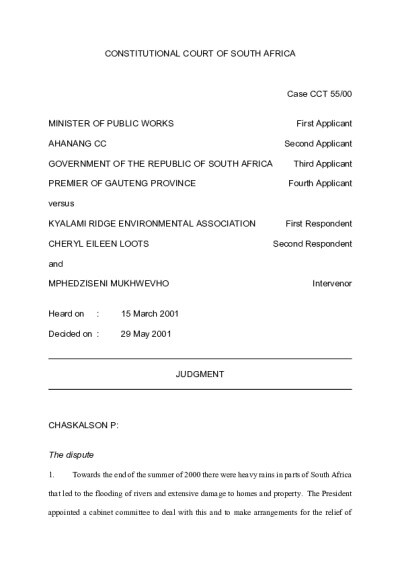
Date
Geographical Area
Southern Africa
Countries
South Africa
Keywords
Case Name
Minister for Public Works & Ors v. Kyalami Ridge Environmental Association & Ors
Case Reference
Case CCT 55/00
Name of Court
Constitutional Court of South Africa
Key Facts
Near the end of 2000, there was heavy rain which led to rivers flooding and extensive damage to housing and property. The South African government decided to establish a transit camp on the grounds of Leeuwkop Prison which was state-owned land. It was intended to house flood victims from Alexandra.
This decision was made without the residents being consulted. A resident’s association, Kyalami Ridge Environmental Association (KREA) was formed and requested a suspension of the operations. This request was rejected by the Government, so KREA sued.
The High Court found in their favour as it appeared to be a permanent facility and the government did not comply with environmental protection, zoning and township laws. This was appealed in the Constitutional Court.
This decision was made without the residents being consulted. A resident’s association, Kyalami Ridge Environmental Association (KREA) was formed and requested a suspension of the operations. This request was rejected by the Government, so KREA sued.
The High Court found in their favour as it appeared to be a permanent facility and the government did not comply with environmental protection, zoning and township laws. This was appealed in the Constitutional Court.
Decision and Reasoning
The Constitutional Court reversed the decision of the High Court. It found that there was no law which prevented the government establishing a temporary camp but that some laws could affect the programme implementation. The Court held that there was no violation to constitutional rights of administrative justice either. The Court took into consideration the flood victims. It held that the government’s constitutional obligation to the right to housing included providing temporary relief to the disaster victims. It determined that the flood victims have a constitutional right to housing.
Outcome
The Constitutional Court held there was no violation to constitutional rights of administrative justice and that the government’s constitutional obligation to the right to housing included providing temporary relief to the disaster victims.
Link
Disclaimer
This case law summary was developed as part of the Disaster Law Database (DISLAW) project, and is not an official record of the case.
Document
Document